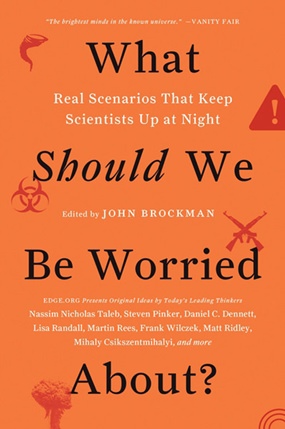 What
keeps scientist awake at night? The book “What Should We Be Worried About?”
is a very interesting slant on today’s world and where we are heading
(ISBN978-0-06-229623-8, Harper Collins Publishers, 2014).
What
keeps scientist awake at night? The book “What Should We Be Worried About?”
is a very interesting slant on today’s world and where we are heading
(ISBN978-0-06-229623-8, Harper Collins Publishers, 2014).
The editor of this book is John Brockman, a chap who began the Edge, an
on-line forum for ideas which Brockman calls, “Frontiers in such areas as
evolutionary biology, genetics, computer science, neurophysiology,
psychology, cosmology and physics.” To those diverse fields, Brockman
proposes a question to be pondered as an annual event. This year the
question was “What should we be worried about?”
The respondents come from an amazingly eclectic group and includes in its
number Seth Shostak, an astronomer; Marco Iocoboni, a neuroscientist and
Professor of psychiatry; Peter Woit, a mathematical physicist; Bruce Parker,
a visiting Professor at the center for Maritime Systems, Stevens Institute
of Technology; Aubrey De Grey, a gerontologist and Margaret Levi, a
political scientist, and another 480 of these luminaries.
With writers coming from such diverse backgrounds, you are going to get a
huge range of things we should be worried about. For example, Aubrey De Grey
is worrying about the disproportionate allocation of funds to study aging,
where life saving research is being passed over because there is no positive
intermediate results - the “now” style of thinking even permeates the
hallowed halls of academia. He finishes his piece saying, “… To benefit
humanity is to agitate for better understanding of probabilistic reasoning
among policy makers, opinion formers, and thence the public.” De Grey
doesn’t enjoy the thought of getting older either! I think most of the
readers and myself would acknowledge that worry.
Vernor Vinge’s essay is on wars “… Fought under a doctrine of mutually
assured destruction (MAD).” This type of warfare was threatened in the 20th
century but if we can avoid blowing ourselves up, the future is rosy.
Steve Giddings, a theoretical physicist looks at black holes and worries
about their significance to us mortals on planet earth and opines “… I am
deeply concerned about how we will arrive at a complete and consistent
theory of gravity.” Unless we do get over this conundrum, on something we
all take for granted, Giddings predicts a dark-energy-dominated future for
society. “The current problems at the foundations link to many big questions
- and I fear it will be no small feat to resolve them.”
At B. 545 this is a very heavy book which produces almost 500 answers to the
Edge question for this year. Amazingly, whilst all the respondents gave
their ideas on what should be a worrisome answer, the vast majority did not
feel that the end of the world is nigh. The potential for self-destruction
was there, but the writers felt that the human intelligence was such that
invoking nuclear wars, for example, did not do anyone any good in the long
run.
This is not light reading for a wet weekend, but even though the chapters
are generally only two pages long, there is enough in those chapters to make
the reader think and digest as well. I really enjoyed this book..

